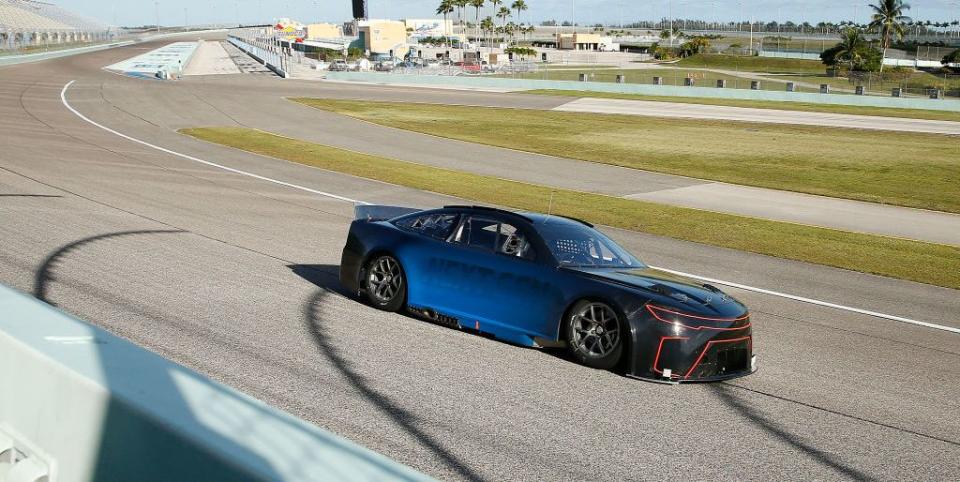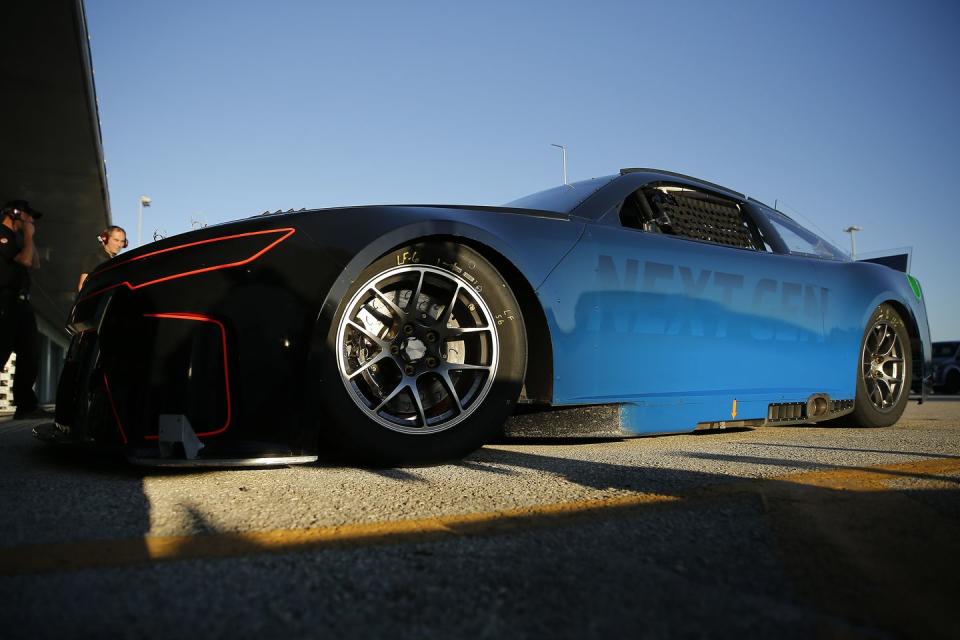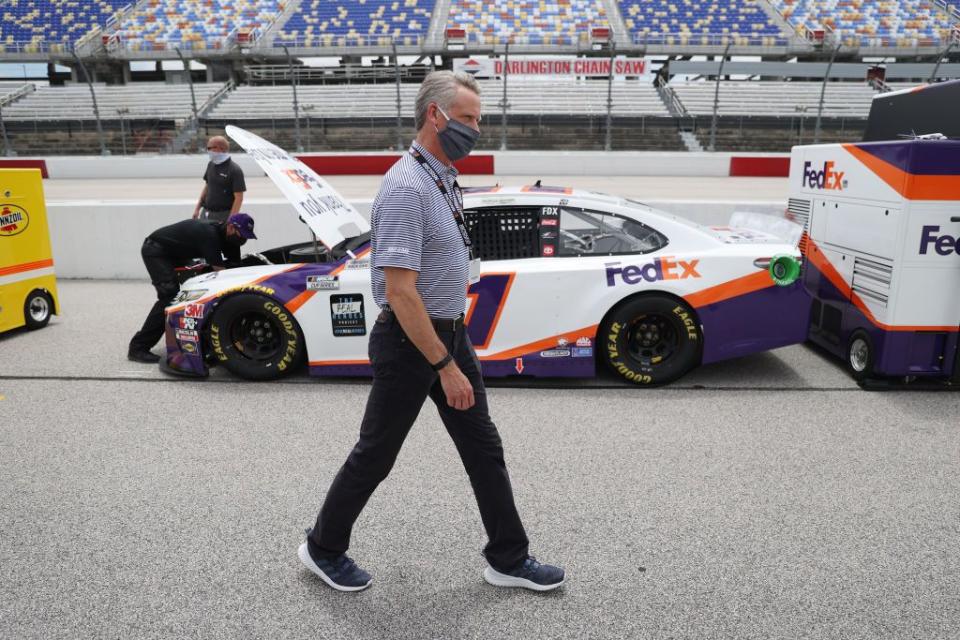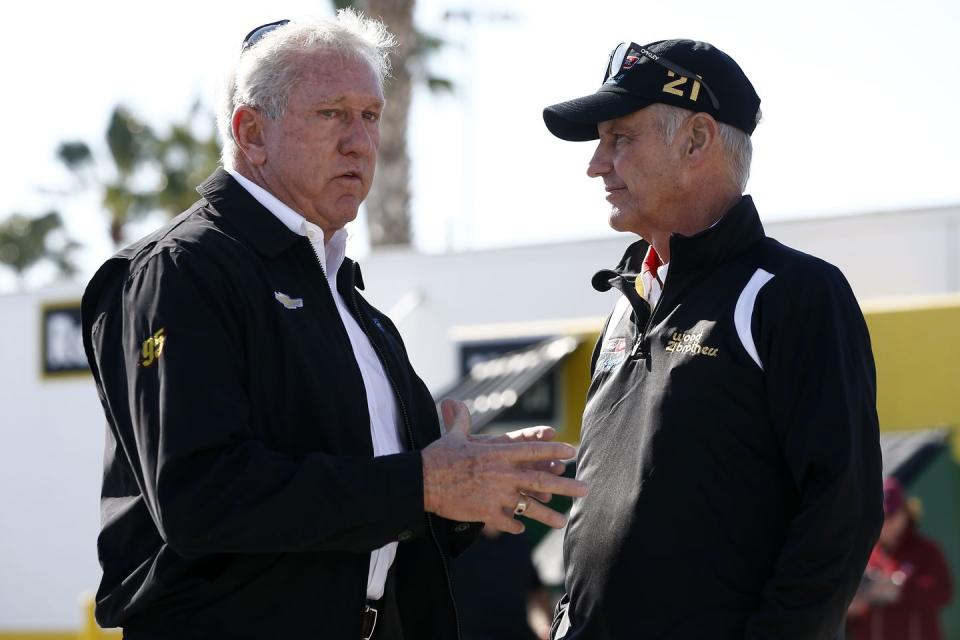NASCAR President: Next-Gen Car Will Be a 'Big Win' for Cost and Competition

Steve Phelps' second full season as president of NASCAR has been anything but routine.
The coronavirus shutdown came five races into the 2020 NASCAR Cup Series season and Phelps spearheaded the decisions over how to return and recover from it during the ensuing two months. Once the season resumed, Phelps was then faced with procedural questions, like when to race, where to race and what the format for each of these events would be.
Meanwhile, NASCAR has been front and center in the renewed national conversation over racial inequality -- Bubba Wallace leading the movement from within the sport. Phelps made the decision to ban the Confederate flag from all NASCAR events and supported shows of unity from inside the garage.
He was forced to rebuild the 2020 schedule in piecemeal fashion, all the while working on a 2021 schedule, and having to delay the next-generation chassis and body that was supposed to debut alongside it to 2022.
Phelps’ season has been anything but procedural.
Alas, his tenure has reached the 2020 playoffs and he remains characteristically optimistic about the future of the sport -- even "at the risk of coming off Pollyanna-ish as he is known to say.
Phelps conducted a state of the sport media video conference on Tuesday to begin media days for the 2020 NASCAR Cup Series Playoffs. A selection of his key takeaways can be found below.

PHELPS IS OPTIMISTIC FOR NEXT-GEN DEBUT
NASCAR Next-Gen is so much more than the next-generation chassis and body scheduled for the 2022 NASCAR Cup Series season.
It’s an all-encompassing concept related to cost containment, new venues and a largely revolutionary car that has more single-supplier (read: spec) components than any that preceded it.
And NASCAR was really hoping to launch this era in 2021 until the COVID-19 pandemic delayed the final months of development for the already up against the clock new car.
The Next-Gen has been tested at Richmond with Austin Dillon on Oct. 18-19, then continued with Joey Logano at Phoenix on Dec. 9-10, Erik Jones at Homestead on Jan. 15-16, William Byron at Auto Club Speedway on March 2-3.
The pandemic delayed follow-up tests until resuming last month with Cole Custer at Dover on August 17. Simultaneously, the Action Express Racing IMSA team tested a car built in house at the Daytona International Speedway Road Course, as NASCAR sought data from the fresh perspective of a sports car team.
NASCAR intends to contest more road course racing, and perhaps a street course event, with the new car -- making the Action Express test extremely valuable.
"(Action Express) had a successful test (and) they did build the car," Phelps said.
Richard Childress Racing built the first two Next-Gen prototypes at NASCAR's direction.

"You know we didn't have a lot of fanfare around it, but I would suggest that test one went very well," Phelps said of Daytona. "The Dover test that Cole Custer was in accomplished what we wanted to accomplish with that car.
"They ran over 500 laps they wanted to see the load on the tires. You know, durability. Every driver that's been in the car has really enjoy driving it.
"The car is meant to do three things: It's meant to to lower costs, it's meant to have better racing, and then from a styling standpoint, it's meant to look more like a showroom car -- a souped-up showroom car but a showroom car nonetheless."
Phelps praised Brandon Thompson (Vice President of Diversity and Inclusion) and (Senior Vice President of Racing Innovation) John Probst, NASCAR officials who have spearheaded much of the Next-Gen's recent testing and development processes.
"The great thing is you've got race teams and OEMs and others who are continuing to provide input and feel a part of this so this isn't just a NASCAR thing," Phelps said. "This is an industry thing (and) the industry is excited about that car coming online."
NOT EVERY CAR OWNER IS HAPPY
Bob Leavine, the owner of Leavine Family Racing, has been a frequent critic of NASCAR’s current direction and leadership group.
Since confirming his decision to sell the No. 95 team to Spire Motorsports at the end of the season, Leavine has vaguely doubled down on everything he believes is wrong with stock car racing’s highest level.
"I had lobbied for a lot of things to change in NASCAR with a lot of owners and was very disappointed in what came out of that meeting," Leavine said on Aug. 4. "I knew that was probably going to be the straw that broke our back. I had to start looking for how best to protect our team. How best do we keep people employed? A lot of things went into that decision."

The delay of the next-gen car made it unrealistic for Leavine to remain in the sport through the 2021 season.
"We had a whole lot of things banking on the Next Gen coming in," Leavine said. "Our deal with Joe Gibbs Racing, our affiliation required us to do certain things. We were looking forward to being a standalone team with one or two cars. So, the pandemic, and sponsorship and how it affected (my construction business) and then having to come back and buy all the cars again for next year, because we had planned on not needing cars next year. It was a snowball effect on multiple things.
"We saw no way out. We could not afford the (Gibbs) affiliation. That’s what we banked on. Okay, we will do this one year, run good, get our charter value up, and we had a plan. That plan came tumbling down with the pandemic. Then you take a bad business model; it doesn’t work for us."
Most recently, Leavine criticized NASCAR for not even reaching out in the weeks after making the decision to sell.
Good comment Jonathan, I really expected nothing from NASCAR but since our announcement I have heard nothing from them . Of course that kind of goes along with our experiences during our first 5 years, never talked to anybody from NASCAR. We came in as nobodies, leaving the same. https://t.co/OApL5ed0gY
— Bob Leavine (@BLeavine) August 30, 2020
"Listen, we're sorry to see Bob leave," Phelps said when asked about the tweet. "And, you know, I've had many conversations with Bob and I know that (NASCAR CEO) Jim France has as well.
"We are sad to see Bob leaving we don't want people leaving the sport. I'm not going to get into names (of) who is interested in coming in but we have a significant number of people who are interested in coming into the sport as owners as well. They're looking at the business model that will be in place. What's in place today, what 2021 is going to look like to continue to try to strip costs out and then what it's going to look like in 2022 and beyond.
"I would suggest that the number of new owners trying to get into this sport has never been higher ... There's just a ton of enthusiasm for the direction of what team ownership looks like."
To his point, Spire will hold two ownership charters starting next season, with the goal of becoming competitive once the new car comes out in 2022.
"We bought this because we’re betting on the sport coming to us," Dickerson told Autoweek last season after the team won a rain shortened race at Daytona. "We believe in the sport. We believe in the (Next-Gen). We believe in the initiatives that NASCAR is undertaking.
"As Chip Ganassi said to us a decade ago, 'own your properties.' ... We have everything leveraged in betting on this sport. We have bet everything that we have ever done on the line because we believe in the future of the sport."
Motorsports veteran and entrepreneur Justin Marks also stated his intent to launch a team that he hopes will be on-track in time to capitalize on the new car -- using a STEM education platform to "serve America’s minorities and underrepresented youth population."
Marks in seeking an ownership charter for the team and that his family foundation will use investment capital to fund 50 percent of the team’s budget and that a "nationwide family entertainment business" will be a sponsor.
Spire and Marks represent the optimistic outlook Phelps has on the sport's future once it gets to the new car.
"We are working with our teams and frankly have been working with our teams over the last four or five years to try to improve the business model," Phelps said. "We want healthy teams (and) if you look at where things are from like a team model standpoint, they're clearly improving.
"And they're improving because we are working with the teams in order to make it better. We have another year unfortunately that we were hoping that the Next-Gen car would come in for 2021 at the Daytona 500. We've delayed that a year, because frankly, we had to."
At the same time, Germain Racing confirmed that it may be forced to sell the ownership charter for its No. 13 team because it does not have a signed sponsor for the 2021 season. The team's longtime sponsor, GEICO, signed as an official NASCAR Cup Series sponsor at the start of the year.
"At this time, anything is on the table,” the team said. “Germain Racing does not have a signed sponsorship contract for 2021, and Bob Germain is exploring conversations for a potential sale."
Phelps is working as diligently as possible to get the current crop of owners, in addition to anyone who wishes to join them, to the next-generation car as soon as possible -- something that pandemic has certainly complicated from a financial standpoint.
"All of this is to bridge to what this Next-Gen car will bring," Phelps said. "You won't need as many cars, they're likely going to cost less. It will be, in my opinion, a big win for the teams.
"And it'll be a big win for the sport, frankly.
"The goal is to have healthy race teams, right? Healthy race teams put on better racing, because they're competing. Then we want as many race cars to be competing for wins as we can. So do I think it's improving. Yes, I think it's improving."

 Yahoo Autos
Yahoo Autos 